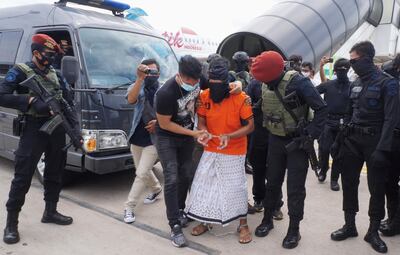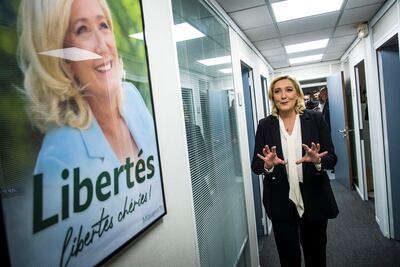The fires of extremism, it seems, are rarely truly extinguished. Around a decade ago Jemaah Islamiyah (JI), the terrorist group responsible for a series of deadly bombings in Indonesia in the early 2000s, appeared to have been severely reduced by a successful crackdown and the arrests of many of its leaders. But in recent years its tactic of infiltrating institutions has led to its resurgence, with 300 suspected terrorists being taken in this year and the country’s elite Densus 88 counterterrorism unit arresting a member of the Indonesian Ulema Council – the nation’s top body of clerics – over alleged links to JI last month. This is alarming to those of us who live in the region as there have been JI cells in Singapore and Malaysia in the past, and the group’s mission to destabilise and divide is not confined to Indonesia.

But in some ways the continuing rise of a different form of extremism in many western countries is even more insidious. In the UK, recently released figures show that the government’s Prevent counterterrorism programme received significantly more referrals relating to far-right extremism than to Islamist radicalisation in the year up to March 21, 2021 – despite the common perception that Prevent was set up specifically to target Muslim communities.
In France, incumbent Emmanuel Macron may lead the latest polling on the presidential election to be held next year, at 25 per cent; but both the second and the third-placed possible candidates, Marine Le Pen and Eric Zemmour, at around 20 and 15 per cent, are from the far right. This is worse than in 2017, when in the presidential election’s first round Ms Le Pen also came second; for then she was followed very closely by the mainstream conservative Francois Fillon and the socialist Jean-Luc Melenchon. Only 21 per cent voted for a far-right candidate in the first round in 2017. This time it could be 35 per cent.

The world is familiar with Ms Le Pen, the leader of the National Rally (formerly the National Front). Mr Zemmour, who has two convictions for hate speech and inciting racial violence, perhaps less so. He has just introduced himself to the English-speaking world in an interview with The Spectator magazine, in which he said: “Immigration is war. They want to invade our European countries." He added: “It is by destroying our cultures, our history, that they make a clean sweep of all that and allow a foreign culture, history and civilisation to come and replace it.”
This “great replacement theory” – that mainly Muslim immigrants from the Mena region are being encouraged to replace white, Christian Europeans by a mysterious transnational elite – might seem too ridiculous and conspiracist for anyone to take seriously. But a survey in France in October showed that 67 per cent were worried that such a phenomenon might take place, while 61 per cent thought that it would.
The French case is not of this wild theory being confined to the far right, as it is in several European countries – although since far-right parties have now been part of governing coalitions in Italy, Austria and Estonia, formed the official opposition in Germany, and almost won the last general election in Finland, they can no longer be said to be on the periphery: the cordon sanitaire has been well and truly breached. But when over two thirds of French people apparently believe in this racist crackpottery, it has gone mainstream.
In some countries, such as the UK, members of what one might call the “robust but still respectable right” are generally careful not to endorse this theory explicitly, while often giving plenty of indications that they do. In others, they have no such qualms. A recent New York Times report noted that this theory had shifted “from the margins towards the centre”, and had been echoed or supported in one way or another by figures including the former US House of Representatives speaker Newt Gingrich, several prominent elected Republican officials, and the Fox News host Tucker Carlson.
In the US, the so-called "replacers' may be from Central and South America rather than Mena, but as Jonathan Greenblatt of the Anti-Defamation League was quoted as saying: “To see things move like this from a pillar of the conspiratorial and paranoid right to a talking point for Tucker Carlson and his allies is really quite frightening.”
I agree. It may be said that to be on the far right, or to believe in the “great replacement theory”, does not necessarily entail advocating violence. But violence often accompanies such beliefs, as it did at the 2017 “Unite the Right” rally at Charlottesville, whose organisers have just been fined $25 million, and in numerous domestic terrorism incidents in the US, to the New Zealand mosque bombings in 2019, and the mass killings by Norwegian Anders Behring Breivik back in 2011.

Violent extremism is to be fought wherever it manifests, and there is no question that Islamist-linked terrorism has been a notable scourge of this century so far. But there is a difference, namely that most Muslim-majority countries have taken huge steps to counter radicalisation and to root out and destroy terrorist networks.
Whereas the “great replacement” theorists and the far right, who may not be violent themselves but have inspired plenty who are, are not hiding. They are not proscribed. They have, instead, occupied or publicly aspire to occupy some of the highest positions of their lands.
In the time of Madness is the title of a fine book by Richard Lloyd Parry about a deadly, chaotic period of Indonesia’s history in the late 20th century. As countries in the West allow a malevolent delusion to permeate and become normalised in their societies, it could well describe them, unable or unwilling in this age of “fake news” and “alternative facts” to expose this theory as the evil nonsense that it is.


